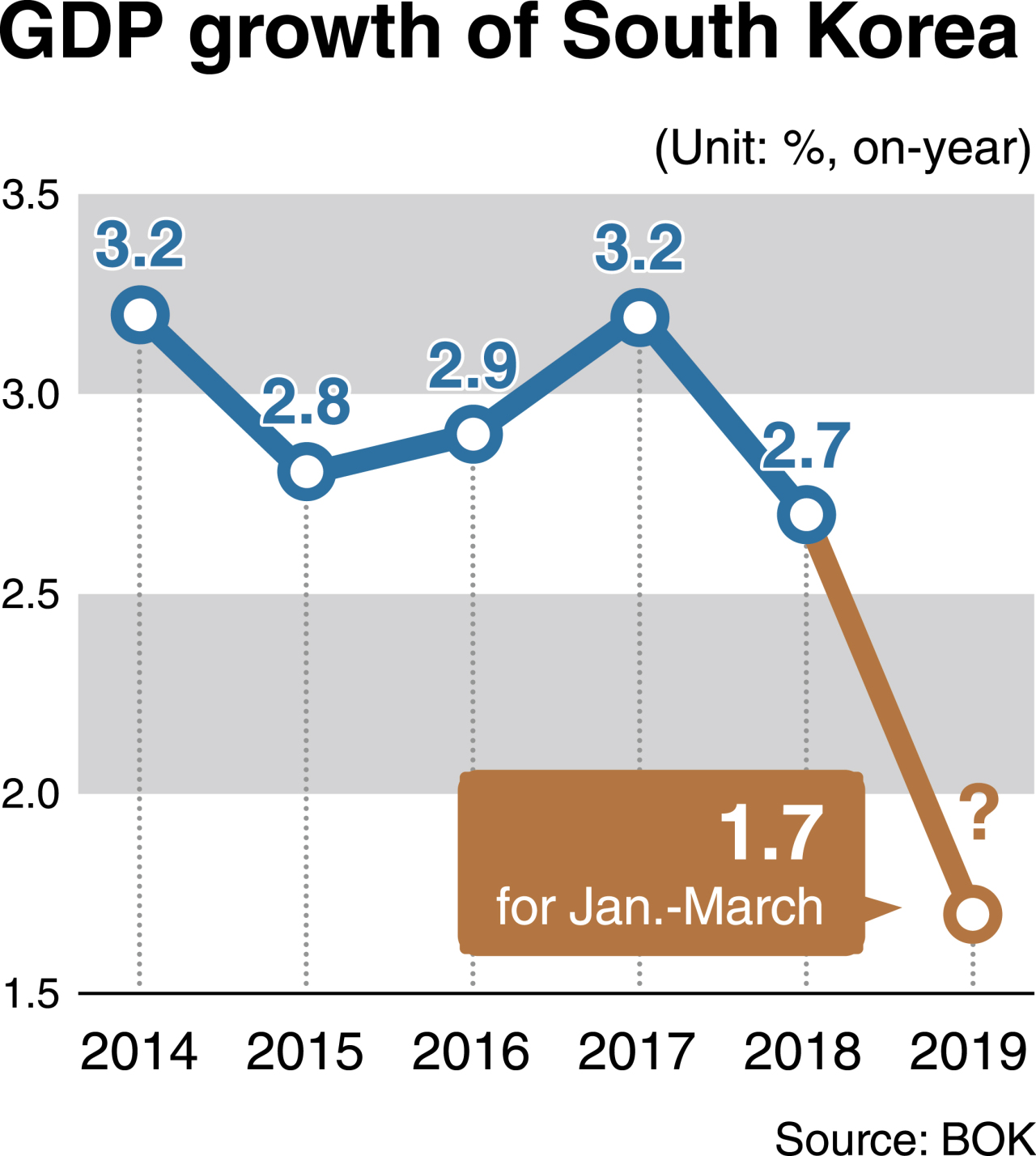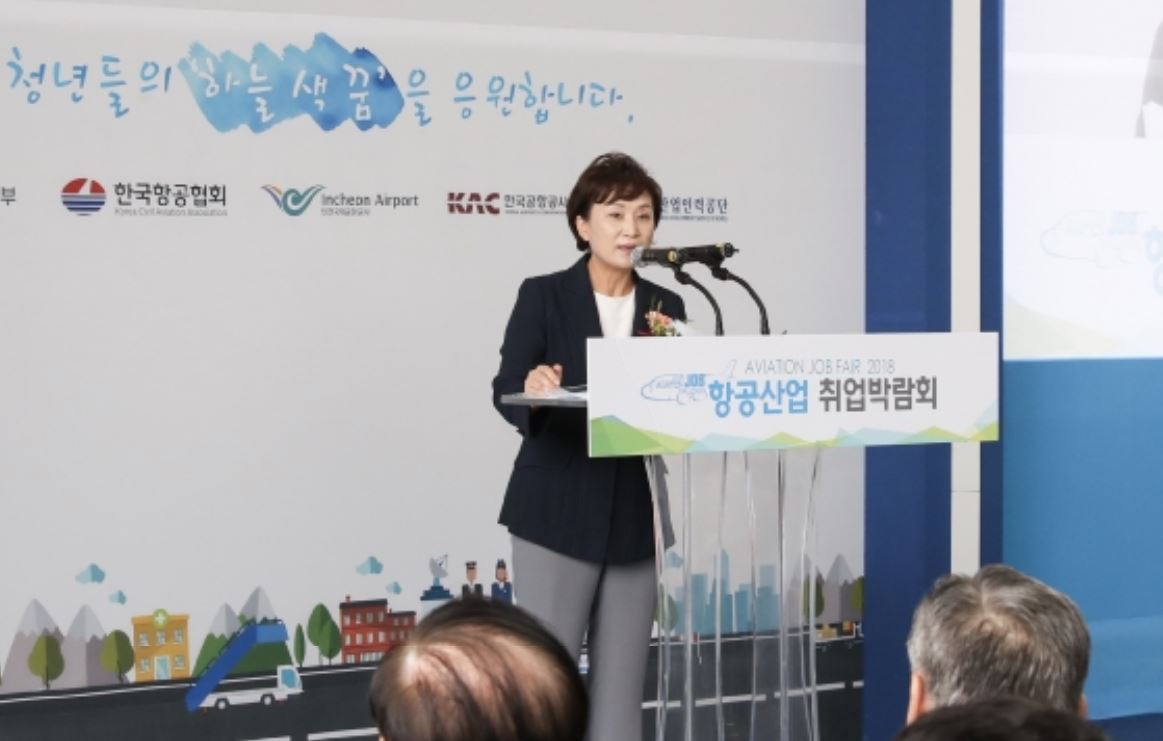[News Focus] Korea’s 2019 growth may fall to 10-year low
By Kim Yon-sePublished : June 20, 2019 - 14:11
SEJONG -- Two major economic indices under the Moon Jae-in administration have plumbed to new lows since the nation was hit by the 2008-09 global financial crisis.
Those are the growth of gross domestic product in the first quarter and the current account balance in April 2019.
South Korea suffered a contraction of 0.4 percent in GDP during the January-March period on a quarter-to-quarter basis.
This was the worst quarter-on-quarter GDP performance since the first year of the Lee Myung-bak government, when it stood at minus 3.2 percent in the fourth quarter of 2008.
Those are the growth of gross domestic product in the first quarter and the current account balance in April 2019.
South Korea suffered a contraction of 0.4 percent in GDP during the January-March period on a quarter-to-quarter basis.
This was the worst quarter-on-quarter GDP performance since the first year of the Lee Myung-bak government, when it stood at minus 3.2 percent in the fourth quarter of 2008.

On an on-year basis, the growth in the first quarter of 2019 posted 1.7 percent, but this was still the first time in nearly a decade that on-year growth had dipped below 2 percent. The last time was the third quarter of 2009, when the economy expanded 0.9 percent.
The poor first quarter performance is aggravating concerns over the possibility that growth will fall under 2 percent for the whole of 2019.
Since sliding to 0.8 percent in 2009 due to the global crisis, the lowest yearly growth rate was 2.4 percent posted in 2012.
“It will not be easy for the collective growth (on an on-year basis) for the remaining three quarters to offset the 1.7 percent in the first quarter nor to surpass the 2.4 percent level,” said a research analyst in Yeouido, Seoul.
Nomura Securities has predicted that the South Korean economy will expand only 1.8 percent this year. Its outlook contrasts with those of the Finance Ministry and the Bank of Korea, whose forecasts are at 2.6-2.7 percent and 2.5 percent, respectively.
Three major global credit rating firms have suggested below 2.5 percent for the nation’s yearly growth -- Standard and Poor’s (2.4 percent), Moody’s Investors Service (2.1 percent) and Fitch Ratings (2.0 percent).
LG Economic Research Institute, which reflected the effect of the coming extra budget worth 6 trillion won-7 trillion won proposed by the Finance Ministry, has predicted a 2.3 percent growth.
“The effect of boosting the economy via the government-led supplementary budget is projected to stay at 0.1 percentage point,” said the institute.
For the other core index, Korea posted a current account deficit worth $664.8 million (782.1 billion won) in April, according to the BOK.
The current account balance -- representing state performance from trade -- posted the first to be in the red in seven years since April 2012, when the nation recorded a deficit of $144.8 million.
This is attributed to lackluster exports, which have continued to post negative growth from the beginning of the year.
Outbound shipments fell by 7.9 percent during the Jan. 1-June 10 period on-year, according to the Korea Customs Service.
The situation is becoming critical as exports plunged 16.6 percent during the June 1-10 period, compared to the same period last year.
An economics professor at Sookmyung University was quoted by a news outlet as saying that “though the global economy was not bad, manufacturers underwent a slowdown.”
He pointed out that “enterprises’ competitiveness has wakened, which is more or less ascribable to excessive hikes in the minimum wage and tighter labor rules (scaling back statutory working hours) under the incumbent administration.”
Amid the growing pessimism, an issue is whether the government could placate the public by unveiling a variety of measures to reinvigorate the economy in its coming announcement of the economic policy direction for the second-half of 2019.

While some professors and research fellows repeatedly called for the Moon government to shift its policy paradigm, the presidential office and the Finance Ministry appear to be still tilting toward people’s income-initiative economic policy and pumping up taxpayers’ money for extra budgets.
An online commenter said that “the GDP growth and youth unemployment rate in Korea have been in inverse proportion to figures held by many OECD countries.”
Public criticism online is rampant over the speculated move to cut the benchmark interest rate. A commenter questioned, “Isn’t there any other economic policy, excepting for boosting the construction sector by easing money-borrowing terms?”
By Kim Yon-se (kys@heraldcorp.com)
















![[KH Explains] Hyundai's full hybrid edge to pay off amid slow transition to pure EVs](http://res.heraldm.com/phpwas/restmb_idxmake.php?idx=652&simg=/content/image/2024/04/18/20240418050645_0.jpg&u=20240418181020)

![[Today’s K-pop] Zico drops snippet of collaboration with Jennie](http://res.heraldm.com/phpwas/restmb_idxmake.php?idx=642&simg=/content/image/2024/04/18/20240418050702_0.jpg&u=)